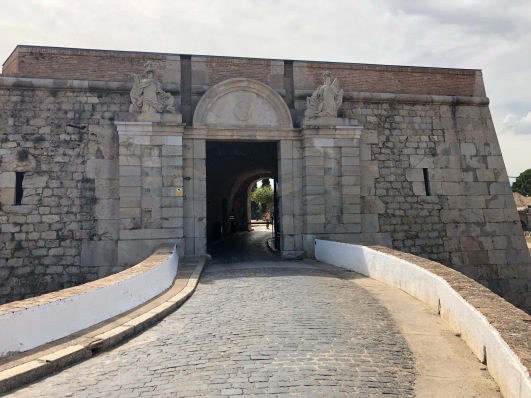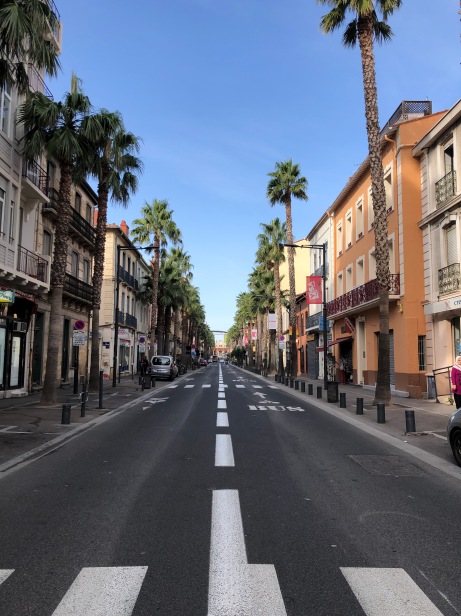
It was our final day in Spain and we had one more place to visit – Figueres. Figueres is in the foothills of the Pyrenees, close to the French border. As we approached, we could see the Pyrenees rising in the distance, some with snow-capped peaks even this early in the season. Our destination was the fort of Sant Ferran, which was both the first and last staging post for the international volunteers.
Ironically, this little town is still the destination for thousands of foreigners because it is the birthplace of Salvador Dali and houses his theatre museum, created out of the bombed ruins of the town’s theatre. We could not pass through and ignore it, so we joined the coach loads of Japanese and visitors of all nations to experience its surreal interior. Then we set out for the fort. By contrast, the fort was virtually empty, its huge defensive walls and vast parade grounds, surrounded by barracks and stables for hundreds of horses, baking silently under the midday sun.
Alice arrived here in July 1937. She had travelled through France by train to Perpignan and then had been taken across the border with a group of volunteer nurses to Figueres. The border crossing from Cerbere to Port Bou is spectacular; standing on the promontory you can look down to the little French harbour town of Cerbere to your left and to your right, is Port Bou’s harbour, with the steep scrubland rising high above it and the deep blue of the Mediterranean stretching away to the horizon. For a young woman from Czechoslovakia this rocky coastline, shimmering in the summer heat must have been breathtaking, and it was coupled with the knowledge that she was finally here, in Spain, embarking on the adventure of a lifetime, about to join the struggle against fascism.

July 1937 was a crucial time in the war, its outcome was still in the balance. Fascist troops from Italy and Germany were fully engaged, the atrocity that was the bombing of Guernica had taken place a few months earlier and the Battle of Brunete, to the west of Madrid, was in full force. Alice, like so many, had responded to the call of the Communist party to volunteer. The Soviet Union had decided to enter the fray and add their military weight to the Republican cause. Arriving at Figueres must have been frantic, with recruits from all nations and of all types arriving and being dispatched for registration to Albacete.

Figueres would also be the site of the Republic’s last stand. In January 1939, the Republican government was forced to retreat there and both fort and town were bombed unmercifully until they were defeated. By this time, however, Alice had gone back home. She left in July 1938, and we know from her own words exactly how it felt to be abandoning Spain, knowing the fight was lost and it would only be a matter of time before Franco and the Nationalists were victorious.
We chose to leave Spain in exactly the same place as Alice. Ignoring the fast motorway that whizzed you across the border without noticing, we drove along the winding coastal road to Port Bou. At the summit, we parked and the small customs house was gone, but a footpath wound up further than the road, so we followed it and found a memorial to all the refugees who had poured over the border in 1939 to escape the reprisals of Franco’s troops. It was estimated that 10,000 arrived at the border each day, reaching a total of 458,000, 78,628 of whom were children. Some were sent back, some managed to flee and the rest were interned in makeshift camps.
Now the difference between the two countries is minimal, a relief for me to have a language I could speak and perhaps for Alice too, although by the time she left Spain, she must have acquired some Spanish. For Alice, however, the culture shock was intense. She crossed the border at night and Port Bou was in darkness. She left a country where people were terrorised and starving, many suffering from diseases for which there were no medicines. France was untouched, the little town illuminated by street lights and the food still plentiful in the shops. However, she would not enjoy that for long, as no sooner had she and her four companions, arrived in the town, but they were arrested. Cerbere, perhaps the name should have heralded a warning, could it be a coincidence that the border town was named after the dog that guarded the underworld?
Her first night in France was spent in a police cell in Cerbere. The next day the five prisoners were moved to Ceret where they faced a ‘procureur’ (state prosecutor), who explained that they would be the first to be condemned by a new law which imposed a penalty of 1-6 months imprisonment on anyone crossing the border without proper documents. The procureur apologised and said he had to apply the law. Alice’s acid comment on the decision, “Why is it that the weak always charge those with whom they have sympathy?” would have a wider resonance than she could possibly know.
She spent the next night in a cell in Ceret, “I feel a whole zoo passes through my cell. In this small cell without air and without light there is room for all: mice, rats, fleas, bugs, lice. Now I see exactly how prison looks from the inside. The stench is almost unbearable.” On the third day, the prisoners were taken by train to Perpignan to serve their sentence. We too, drive on to Perpignan.

Alice describes her walk from Perpignan station to the prison and so it was easy for us too to follow it. In fact, our hotel was on the rue de la Gare (Station Road), then lined with plane trees, now with tall palms. Many of the houses remain the same, attractive buildings with metal balconies. What a contrast to her first arrival in Perpignan, to find herself escorted by police from one stinking police cell to what she imagined would be another. Worst of all, was the knowledge of what she had left behind. Like her, we were able to pass the statue of Jean Jaures, although since she passed it, it has been moved slightly to accommodate a new open plaza in front of a large FNAC store.

I knew the exact street we were looking for because Alice mentions it in her account, but I didn’t know whether the prison would still be there. However, as we turned the corner, a large building with heavily barred windows was immediately visible. As we reached it, the word PRISONS was carved in stone above the door. No longer in use as a prison, it now houses an exhibition about the Algerian War and a social centre for Algerians. We went in, and discovered that the prison had two separate wings for men and women and the women’s wing had been restored. The men’s wing was closed off and structurally unsafe. I realised as I looked up at the archway leading to the staircase, with the words, “Quartiers des Femmes” painted above it, that these were the stairs used by Alice. I had not fully understood her description of her days in this prison until I was inside it. She had described her days in the company of two other women in a ground floor room and then at seven in the evening, after dinner, they went upstairs to sleep. The larger communal room was still there, as were the cells upstairs. I had never imagined I would be able to walk through exactly where she had spent her days.
By comparison with the dank cell in Ceret, Alice describes this prison as a “paradise”. Her two fellow prisoners help her to wash and give her cleaner clothes, they share their food with her, one of them has it delivered each day from a local restaurant, and they share stories. She shares the night-time cell with another woman, Lucy, coincidentally also a lawyer and when Alice asks why she is in prison, she answers, “I killed my husband.” In the days that follow, the women learn a great deal about each other; it was obviously an experience Alice remembered with something close to affection. She was always prepared to talk about her experiences in Spain and wrote a long account of her departure and imprisonment in Perpignan, so very different from her response to the years spent in prison in Czechoslovakia, about which she was silent.
It was the end of the journey. Alice was released a few weeks later and in the last days of summer, she returned to Erwin In Zilina. On the 30th of September, the Munich Agreement was signed and all her worst fears were realised. Having visited the prison, we too left Perpignan and headed home through France in the late summer sun.






Being prepared to talk about her experiences in Spain indeed suggests that she felt she had achieved something, something important and worthwhile, even if the outcome went against the Republicans. Contrast your point about her later silences about prison in Czechoslovakia: I guess there she more likely felt the betrayal of that cause and of her efforts, and presumably the ironic futility of the position she then found herself in?
It must have been a fascinating journey for you, Liz. Your accounts have certainly provided more fascinating reading!
LikeLike
How extraordinary to have been able to trace her steps so accurately. I can’t help but wonder whether she ever thought that anyone would ever care about her movements in any way, let alone research and recreate them. How wonderful of you to recognise and value her life so very highly. Much love Anne
Sent from my iPhone
>
LikeLike
I really look forward to getting the next chapter and always read it with great interest. I love your style of writing and the quality of your research which is enabling you to follow in her footsteps and enhances your understanding of who Alice was. She was an extraordinary woman. Her passion and commitment to her ideals is humbling, isn’t it? She actually acted on her beliefs and gave up so much for them.
LikeLike
It’s hard to imagine how you will ever take a normal holiday again, Liz.
Presumably, with sufficient research, you can always travel in someone else’s footsteps and what a vivid way to engage with the past.
You have given me much pleasure as I vicariously joined you in your and Alice’s journeys
LikeLike